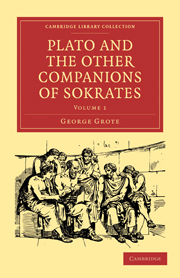Book contents
- Frontmatter
- PREFACE
- Contents
- CHAPTER I SPECULATIVE PHILOSOPHY IN GREECE, BEFORE AND IN THE TIME OF SOKRATES
- CHAPTER II GENERAL REMARKS ON THE EARLIER PHILOSOPHERS—GROWTH OF DIALECTIC—ZENO AND GORGIAS
- CHAPTER III LTFE OF PLATO
- CHAPTER IV PLATONIC CANON, AS RECOGNISED BY THRASYLLUS
- CHAPTER V PLATONIC CANON AS APPRECIATED AND MODIFIED BY MODERN CRITICS
- CHAPTER VI PLATONIC COMPOSITIONS GENERALLY
- CHAPTER VII APOLOGY OP SOKRATES
- CHAPTER VIII KRITON
- CHAPTER IX EUTHYPHRON
- CHAPTER X ALKIBIADES I. AND II.
- CHAPTER XI HIPPIAS MAJOR—HIPPIAS MINOR
- CHAPTER XII HIPPARCHUS—MINOS
- CHAPTER XIII THEAGES
- CHAPTER XIV ERASTÆ OR ANTERASTÆ—RIVALES
- CHAPTER XV ION
- CHAPTER XVI LACHES
- CHAPTER XVII CHARMIDES
- CHAPTER XVIII LYSIS
- CHAPTER XIX EUTHYDEMUS
CHAPTER XI - HIPPIAS MAJOR—HIPPIAS MINOR
Published online by Cambridge University Press: 05 October 2010
- Frontmatter
- PREFACE
- Contents
- CHAPTER I SPECULATIVE PHILOSOPHY IN GREECE, BEFORE AND IN THE TIME OF SOKRATES
- CHAPTER II GENERAL REMARKS ON THE EARLIER PHILOSOPHERS—GROWTH OF DIALECTIC—ZENO AND GORGIAS
- CHAPTER III LTFE OF PLATO
- CHAPTER IV PLATONIC CANON, AS RECOGNISED BY THRASYLLUS
- CHAPTER V PLATONIC CANON AS APPRECIATED AND MODIFIED BY MODERN CRITICS
- CHAPTER VI PLATONIC COMPOSITIONS GENERALLY
- CHAPTER VII APOLOGY OP SOKRATES
- CHAPTER VIII KRITON
- CHAPTER IX EUTHYPHRON
- CHAPTER X ALKIBIADES I. AND II.
- CHAPTER XI HIPPIAS MAJOR—HIPPIAS MINOR
- CHAPTER XII HIPPARCHUS—MINOS
- CHAPTER XIII THEAGES
- CHAPTER XIV ERASTÆ OR ANTERASTÆ—RIVALES
- CHAPTER XV ION
- CHAPTER XVI LACHES
- CHAPTER XVII CHARMIDES
- CHAPTER XVIII LYSIS
- CHAPTER XIX EUTHYDEMUS
Summary
Hippias Major—Situation supposed—Character of the dialogue. Sarcasm and mockery against Hippias
Both these two dialogues are carried on between Sokrates and the Eleian Sophist Hippias. The general conception of Hippias—described as accomplished, eloquent, and successful, yet made to say vain and silly things—is the same in both dialogues: in both also the polemics of Sokrates against him are conducted in a like spirit, of affected deference mingled with insulting sarcasm. Indeed the figure assigned to Hippias is so contemptible, that even an admiring critic like Stallbaum cannot avoid noticing the “petulans pene et proterva in Hippiam oratio,” and intimating that Plato has handled Hippias more coarsely than any one else. Such petulance Stallbaum attempts to excuse by saying that the dialogue is a youthful composition of Plato: while Schleier macher numbers it among the reasons for suspecting the dialogue, and Ast, among the reasons for declaring positively that Plato is not the author. This last conclusion I do not at all accept: nor even the hypothesis of Stallbaum, if it be tendered as an excuse for improprieties of tone: for I believe that the earliest of Plato's dialogues was composed after he was twenty-eight years of age—that is, after the death of Sokrates. It is however noway improbable, that both the Greater and Lesser Hippias may have been among Plato's earlier compositions. We see by the Memorabilia of Xenophon that there was repeated and acrimonious controversy between Sokrates and Hippias: so that we may probably suppose feelings of special dislike, determining Plato to compose two distinct dialogues, in which an imaginary Hippias is mocked and scourged by an imaginary Sokrates.
- Type
- Chapter
- Information
- Plato and the Other Companions of Sokrates , pp. 364 - 402Publisher: Cambridge University PressPrint publication year: 2010First published in: 1865
- 1
- Cited by



